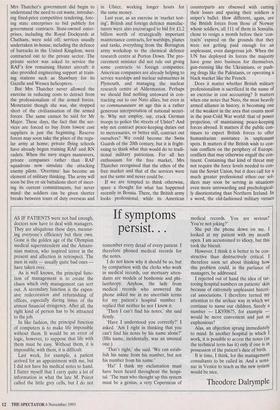If symptoms persist. . .
AS IF PATIENTS were not bad enough, doctors now have to deal with managers. They are ubiquitous these days, measur- ing everyone's efficiency but their own. Gone is the golden age of the Olympian medical superintendent and the Amazo- nian matron, who inspired terror in the present and affection in retrospect. The men in suits — usually quite bad ones — have taken over.
As is well known, the principal func- tion of management is to create the chaos which only management can sort out. A secondary function is the expen- sive redecoration and refurnishing of offices, especially during times of the utmost financial stringency. After all, the right kind of person has to be attracted to the job.
In like fashion, the principal function of computers is to make life impossible without them. It would be an error of logic, however, to suppose that life with them must be easy. Without them, it is impossible; with them, it is difficult.
Last week, for example, a patient arrived for an appointment with me, but I did not have his medical notes to hand. I flatter myself that I carry quite a lot of information in what the late M. Poirot called the little grey cells, but I do not
remember every detail of every patient. I therefore phoned medical records for the notes.
I do not know why it should be so, but by comparison with the clerks who work in medical records, our mortuary atten- dants are models of bonhomie and phi- lanthropy. Anyhow, the lady from medical records who answered the phone asked me in no uncertain terms for my patient's hospital number. I replied that neither he nor I knew it.
'Then I can't find his notes,' she said firmly.
'Have I understood you correctly?' I asked. 'Am I right in thinking that you can't find his notes by his name alone?' (His name, incidentally, was an unusual one.) 'That's right,' she said. 'We can estab- lish his name from his number, but not his number from his name.'
'Ha!' I think my exclamation must have been heard throughout the hospi- tal. 'The man who thought up this system must be a genius, a very Copernicus of medical records. You are serious? You're not joking?'
She put the phone down on me. I looked at my patient with my mouth open. I am accustomed to idiocy, but this took the biscuit.
However, I think it is better to be con- structive than destructively critical. I therefore soon set about thinking how this problem could, in the parlance of managers, be addressed.
rejected out of hand the idea of tat- tooing hospital numbers on patients' skin because of extremely unpleasant histori- cal associations. I therefore turned my attention to the archaic way in which we continue to name our children. Surely a number — LK930675, for example — would be more convenient and just as euphonious?
Alas, an objection sprang immediately to mind. In another hospital in which I work, it is possible to access the notes (as the technical term has it) only if one is in possession of the patient's date of birth.
It is time, I think, for the management consultants to be called in. And a semi- nar in Venice to teach us the new system would be nice.
Theodore Dalrymple










































































 Previous page
Previous page